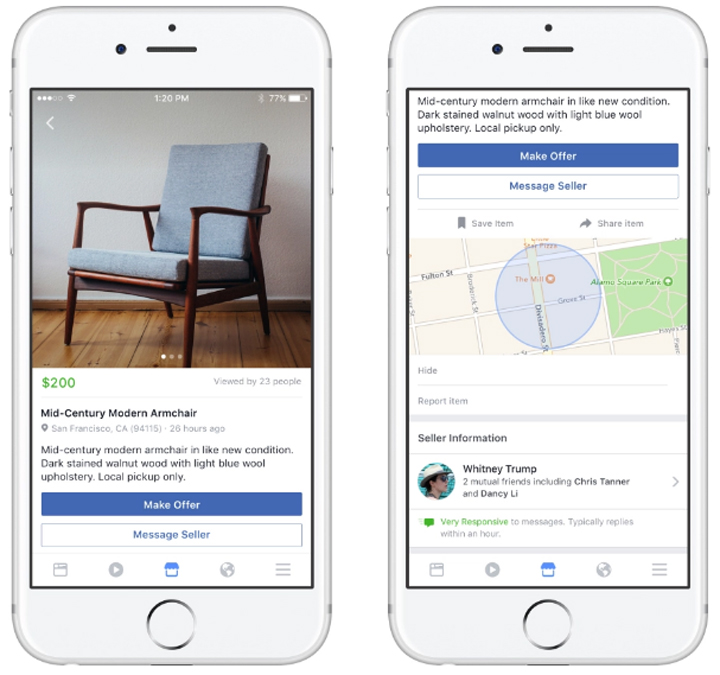Correction: Based on incorrect information provided by Facebook to Global News, a previous version of this story said Marketplace would roll out in Canada as well as 17 European countries on July 27. In fact, the launch happened only in Canada on that date. The copy below has been updated accordingly.

Nearly a year after its launch in the U.S., U.K. and Australia, Facebook Marketplace is coming to Canada.
The company is rolling out its peer-to-peer shopping feature in this country Thursday.
Marketplace is a new tab in the Facebook app that lets users buy and sell items in their communities. Canadians will now be able to browse a customized feed of products for sale, post their own stuff for sale, and easily use the Messenger app to contact buyers and sellers.
READ MORE: How Facebook groups can help new moms save
Marketplace is the outgrowth of Facebook groups, which already allow members to buy and sell online.
With over 6.5-million Facebook groups in this country, many Canadians are already well acquainted with Facebook’s potential for peer-to-peer shopping.
Buy-and-sell Facebook groups are where many budget-conscious couples turn for low-cost wedding props and decor. And they’ve become an essential resource for moms looking to buy gently used baby and kids’ items or to make a buck while emptying the house of outgrown children’s clothes and forgotten toys.
READ MORE: This couple is saving a bundle on wedding costs — thanks to Facebook
Marketplace is building on the success of the groups’ buy-and-sell feature. In doing so, it makes the peer-to-peer experience more user friendly – but also, perhaps, a little less friendly.
WATCH: Facebook developing brain-powered technology

How it works
Marketplace appears as a blue icon resembling a lemonade stand at the bottom of the Facebook app.
Buying

Get weekly money news
Click on the tab you’ll be able to see an inventory of items for sale that Facebook thinks you’ll be interested in. If you’re buying and selling through the groups, the app will probably have a better idea of what you like. If not, results will become more relevant the more you use Marketplace, Vivek Sharma, director of product management at Facebook Marketplace, told Global News.
The app allows you to select a distance radius for your search, if you don’t feel like trekking across town to pick up whatever it is you’re looking for. You can also choose a price range and set up alerts for items you’re interested in.
As with Facebook groups, you’ll be able to see the profile of people selling online. But marketplace also allows you to view a person’s selling history.
Notably, the Marketplace search function is much more advanced. In addition to searching for a specific product, you can browse by category, view your recent searches and see trending items.
READ MORE: Airbnb for cars is helping this Toronto man pay off his Tesla
Selling
The basics are the same as with most other buy-and-sell apps: Take a photo of your item (or select one from your camera roll), post that and a short description, pick a price, and you’re good to go.
With Marketplace you’ll also have to pick a city or town where you want to sell and a distance radius. There is no option to broadcast your sale province- and Canada-wide, as Facebook wants to keep things local for now, Sharma said.
Users can also indicate how much the item they’re selling would cost if bought new. And they can decide to also post it to Facebook groups, as well as on their personal profile.
In a nod to eBay, you’ll also be able to see how many views your sale post is getting and lower your price if it doesn’t seem to be receiving enough attention.
You’ll get an in-app notification when an interested buyer gets in touch.
WATCH: Facebook hires 3,000 new staff to curb violent videos

Pros and cons
Many things, from the search feature to setting up alerts, appear easier to do on Marketplace than using the groups.
Perhaps the biggest improvement is that Marketplace allows you to easily contact and haggle with buyers and sellers either through the tab itself or using Messenger. Your counterpart will get message notifications even if they’re not your Facebook friend, which currently isn’t the case on Facebook groups.
Marketplace, though, feels a little more like Craigslist and a little less like Facebook.
It’s obvious that the company is going to great lengths to ensure safety. For example, users buying big-ticket items like cars will see a pop-up with tips about how to avoid scams.
Whenever you contact a buyer or seller, a message from Facebook reminds you not to share your e-mail, phone or financial information.
WATCH: Red flags to spot when shopping online
And although Marketplace doesn’t have a peer-review option like many other buy-and-sell apps, it allows users to anonymously report abusive content or behaviour.
But Marketplace is a more impersonal online space than the Facebook groups, which are often restricted to a specific neighbourhood or people with similar interests.
Forcing users to trade online using their Facebook profiles might go a long way toward ensuring safety. But is it enough to deter less serious bad behaviour, such as no-shows?
Sharma said Marketplace has inherited the culture of Facebook groups, where peer-to-peer pressure and self-policing generally keep flaky buyers and sellers at bay.
Still, Facebook may catch inappropriate posts, such as pornography. Whether it will also reliably detect misleading sales pitches, as many volunteer administrators of Facebook groups do, remains to be seen.
For those who prefer a cozier peer-to-peer shopping experience, Facebook groups aren’t going anywhere.









Comments
Want to discuss? Please read our Commenting Policy first.